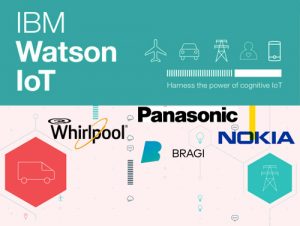
 IBM was joined by some of the biggest names in the industry to highlight how IBM Watson IoT technologies are poised to drive a new wave of innovation in the home and play a key role in one of the biggest technological transformations in the history of the world.
IBM was joined by some of the biggest names in the industry to highlight how IBM Watson IoT technologies are poised to drive a new wave of innovation in the home and play a key role in one of the biggest technological transformations in the history of the world.
According to Harriet Green, global head, IBM Watson IoT said, "Millions of sensors are giving appliances and devices eyes and ears, increasing their inbuilt intelligence and enabling them to interact with us better."
"The challenge is that over next few years, the Internet of Things will become the biggest source of data on the planet. That’s where IBM’s Watson cognitive computing system comes in. Watson uses machine learning and other techniques to understand this data and turn it into insight, which can help automate tasks, enable manufacturers to design better products, innovate new services and enhance our overall quality of life - especially in the home. And with cognitive technologies, interactions with ‘things’ through natural language and voice commands will dramatically improve," added Green during her keynote at IFA.
Whirlpool is using Watson technologies to help deliver superior customer service and enhance people’s lives at home by enabling its home appliances to connect with and interact with one another and their users.
For example, a Whirlpool washing machine will communicate directly with a Whirlpool dryer letting it know what kind of laundry load to expect and the optimum drying program to use - saving precious time and helping to reduce energy consumption in the home.
"By instilling our appliances with intuitive smart home technologies we are opening up a new era of partnerships in the home", said Norbert Schmidt, vice president Product and Brand, Whirlpool EMEA.
Panasonic is also exploring how Watson’s unique machine learning and natural language processing capabilities can help transform the services it provides to consumers - giving them greater peace of mind knowing that their homes are comfortable, safe and secure.
One of the areas in focus is home safety and security where Panasonic’s security cameras and sensors to detect movement, glass breakage, door and window opening, will be coupled with Watson’s cognitive computing capabilities. Thanks to video analytics, a home security system would know not to react if the neighbors’ children are just fetching their football, but will automatically alert the police or security services if likely intruder tries to scale a fence to enter the property.
David Tuerk, Panasonic's European General Manager for Smart Home said, "Enriching our smart home technology solutions with Watson's cognitive computing capabilities will enable us to offer more secure, smart homes, residents ensuring the well-being and safety of residents - especially more vulnerable family members such as the elderly and young children.
More connected homes are safer homes for vulnerable family members especially the elderly. Cognitive and IoT technologies are opening up new opportunities for the discreet monitoring and care of elderly and sick people at home.
IBM and Nokia are exploring opportunities to integrate IBM Watson IoT with Nokia wearables and smart devices for home care. Their goal is a system that helps to detect and alert caregivers to potential problems such as: deviation from daily routines, abnormal vital signs and sudden changes in the home environment.
Bragi - an early pioneer in the hearables market - has turned to IBM to help develop innovative business solutions for the workplace. The company’s smart earphones, The Dash, are some of the world’s most powerful micro-wearable computers with 27 unique sensors that can measure a user’s vital signs while augmenting their communications and interactivity. With Kickstarter funding, Bragi has already successfully launched The Dash onto the consumer market for sport and recreation.
"Hearables will transform the way we work and have a tremendous impact on the business processes of the future," said Nikolaj Hviid, CEO and founder of Bragi.
"The Dash is uniquely equipped to realize the potential of truly contextual audible computing. We are very excited to tap IBM’s industry leading cognitive computing capabilities through the Watson IoT platform as well as benefit from IBM’s enormous experience in global innovation that touches people’s lives," added Hviid.
See What’s Next in Tech With the Fast Forward Newsletter
Tweets From @varindiamag
Nothing to see here - yet
When they Tweet, their Tweets will show up here.





























